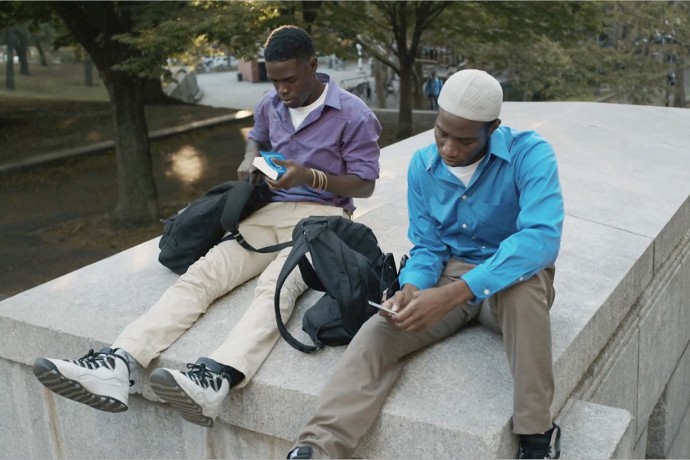Naz & Maalik is a groundbreaking film. Featuring two black, gay Muslim teenage boys, the film, written and directed by Jack Dockendorf, is based on interviews with youth living at the intersections of multiple identities.
Sure, there are plenty of movies and TV shows featuring lesbian, gay, and even transgender characters. But the vast majority of these are white. Occasionally there will be a nod towards someone who happens to be gay and a person of color. Or gay and living a religious lifestyle (such as 2001’s Trembling Before G-d, about the Orthodox Jewish community ).
But gay, POC, and Muslim? Forget it.
Which is part of what makes this film so unique. Naz & Maalik explores and makes visible the experiences of a group most Americans have never considered.
Brandon Judell, writing in HuffPost, agrees that the film offers a powerful take. But he finds one of the film’s main subplots “ridiculous” and “poorly scripted.” A government agent suspects the boys of terrorist activities, and becomes interested in their love story in a way that seems out of place—and it’s true, the writing of those scenes leaves much to be desired.
But one aspect of this subplot very much hits home. An NYC cop meets up with the FBI agent after attempting to sell the boys a gun, claiming that they almost bought it from him. The agent says at first that it doesn’t sound like a lead—until she sees the boys, and decides to trail them.
She sees that they are black and decides that they are dangerous.
The writing and acting in the scenes is awkward, but the relationship between (white) law enforcement and black youth like Naz and Maalik is unfortunately all too real.
The same can be said for the rich white man who invites Naz into his expensive loft, obviously hoping to hook up. His interest in Naz seems to be based on a fetish for cultural difference. “New York City, it’s like a Mecca for meeting new people, hmm?”A funny choice of words, given the kufi on Naz’s head.
Reviewers have noted that the film might have made more of an impact if it had stuck to the love story between the two boys and the issue that they face within their homophobic families, and scrapped the FBI subplot. Hollywood Reporter calls it a “shaky attempt at dramatic incident.” Variety claims that the film has potential, which it squanders on an “innocuously blasé hangout narrative.”
Perhaps the director was attempting to show that kids like Naz and Maalik face accusations of terrorism from the federal government because of their religious affiliation, and potential discrimination from police based on their race. An honorable goal, but not one achieved gracefully in the film.
But groups affected by multiple sites of oppression don’t often have the luxury of focusing solely on issues of coming out.
As the Hollywood Reporter‘s Sheri Linden notes, the references to government spying definitely convey the atmosphere of “intrusive monitoring.” People like Naz and Maalik have to worry about what their families might think of their sexuality, it’s true, but they also have to constantly watch their backs for mistreatment at the hands of police. Issues of group cohesion are much more critical for tight-knit minority communities—being disowned from your family can mean being rejected by the community that you have grown up in.
And if you are continuously suspected of criminal or terrorist activity from those outside the community, you might have nowhere to go.
Focusing solely on the struggles with homophobia within the boys’ families—as other reviewers have suggested—would be be problematic for another reason: this would run the risk of creating further tension between an imagined progressive (white) majority, and a regressive, homophobic (Muslim and/or black) minority. Only looking at this aspect of the boys’ lives would erase a large portion of their identities, and ignore the massive amount of discrimination that they face from outside of their community.
As Naz notes, change is not the same thing as progress.
Naz: “You think the world’s getting better?”
Maalik: “Yeah.”
Naz: “Mmm. I don’t think so. Change gets too much credit. They confuse it with progress. They don’t even realize the truth”
Lesbians and gays in the US have made great strides toward equality, but that does not mean that progress has been achieved for all—especially if this notion of progress is used as a rallying point against people of color and religious minorities.





